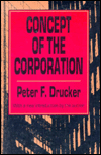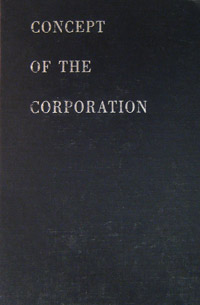|
0006. Concept of the Corporation (1945) by Peter F. Drucker
Concept of the Corporation (1945)



Concept of the Corporation
by Peter F. Drucker, Peter F. Drucker (Introduction), Peter Ferdinand Drucker (Introduction)
Average Customer Rating: (2 ratings)
Read customer reviews Write a Review
Publisher: Transaction Publishers
Pub. Date: January 1993
ISBN-13: 9781560006251
Sales Rank: 381,777
329pp
Edition Description: Revised
Table of Contents
Introduction to the Transaction Edition
Preface to the 1983 Edition
Preface to the Original Edition
I Capitalism in One Country 1
II The Corporation as Human Effort 20
1 Organization for Production 20
2 Decentralization 41
3 How Well Does It Work? 72
4 The Small Business Partner 98
5 Decentralization as a Model? 115
III The Corporation as a Social Institution 130
1 The American Beliefs 130
2 The Foreman: The Industrial Middle Class 163
3 The Worker 176
IV Economic Policy in an Industrial Society 209
1 The "Curse of Bigness" 209
2 Production for "Use" or for "Profit"? 230
3 Is Full Employment Possible? 264
Epilogue (1983) 291
Index 323
| Create Date : 17 มีนาคม 2551 |
|
3 comments |
| Last Update : 18 มีนาคม 2551 22:00:26 น. |
| Counter : 1745 Pageviews. |
|
 |
|
Concept of the Corporation
The Classic Study Of The Organization And Management Policies Of General Motors-The Company That Has Become The Model For Modern Large Scale Corporations Across The World.
Year of Publication: 1945
Publisher: Transaction Publishers
copy มาจาก Dr.Danai @ DNT Consultants